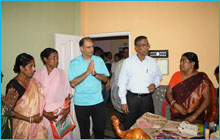 October 17, 2012 -- Microfinance institution Bandhan, based in West Bengal and with operations in India’s poorest states, was the first stop for Rashad Kaldany on his recent trip to India.
October 17, 2012 -- Microfinance institution Bandhan, based in West Bengal and with operations in India’s poorest states, was the first stop for Rashad Kaldany on his recent trip to India.
With IFC’s support, Bandhan reaches almost 4 million women at the base of the pyramid in some of these poorest states, including in northern and eastern India.
Struck by the experience of Bandhan's women borrowers in Kolkata who transformed their own lives and also the lives of their families, VP Kaldany said, “By prioritizing our support to inspirational organizations like Bandhan in India’s low-income states, IFC makes real, large-scale impact.”
IFC invested equity in the company in FY11, giving confidence to the sector at a time when microfinance institutions in India found themselves under severe stress.
Bandhan expects to expand its outreach exponentially in the next five years, offering accessible finance to underserved women and households by designing and offering new customized products, and establishing international best practices in its operations and governance.
Reaching India’s Frontier
Basic needs have to be met and economic opportunities created for low-income and underserved people living in the states of Bihar, Chattisgarh, Jharkhand, Madhya Pradesh, Orissa, Uttar Pradesh and West Bengal, and the northeastern states of Assam, Arunachal Pradesh, Manipur, Meghalaya, Mizoram, Nagaland, Sikkim and Tripura. For IFC, providing investment and advisory services to organizations that are willing to take the risk and expand in India’s low-income states is top priority.
IFC’s strategy to do more in frontier regions has reflected in the IFC team’s ability in seeking out inspiring institutions across a range of sectors to partner with. These institutions are innovating and implementing business models that are sustainable to meet basic needs of the underserved.
In recent years, IFC has invested in Magma, a non-banking finance institution in West Bengal, Au Financiers in Rajasthan. Magma plans to reach over 500,000 borrowers in the next five years. Both these institutions offer loans to first time borrowers setting up small businesses.
Our work with investee-client DSCL, an Indian sugar company, and with sugarcane farmers in Uttar Pradesh helped them to enhance their productivity by 34 percent over three years. The pilot is now being replicated to reach over 200,000 farmers in India. IFC also invested in Paradeep Phosphates, a fertilizer company in Orissa, and plans training programs for farmers to improve yield and income levels.
In FY12, IFC supported Pragati, a fund dedicated to small businesses in low-income states. IFC invested in Mahindra Solar One in Rajasthan to install a solar photovoltaic plant to help electrify rural parts of the country. An innovative advisory project in Bihar is supporting automation of Government-to-Person payments to enhance efficiency of health workers and doctors by 10-15 percent. The project once implemented in the state could be replicated across India. The tax reform work in Bihar has simplified taxation for small businesses and e-filing platforms are making paying taxes easier.
While in Delhi, Kaldany also signed a new project with India’s government-owned central mortgage registry to increase transparency in India’s lending framework while improving access to credit for small businesses. Through this project, small businesses and entrepreneurs—especially women who own few fixed assets— will find it easier to obtain the financing they need to grow.
Convinced of the transformation that is possible and the enormous needs in India's frontier, Kaldany concluded, “A bulk of IFC’s future business in India will be coming from India’s low-income and northeastern states.”